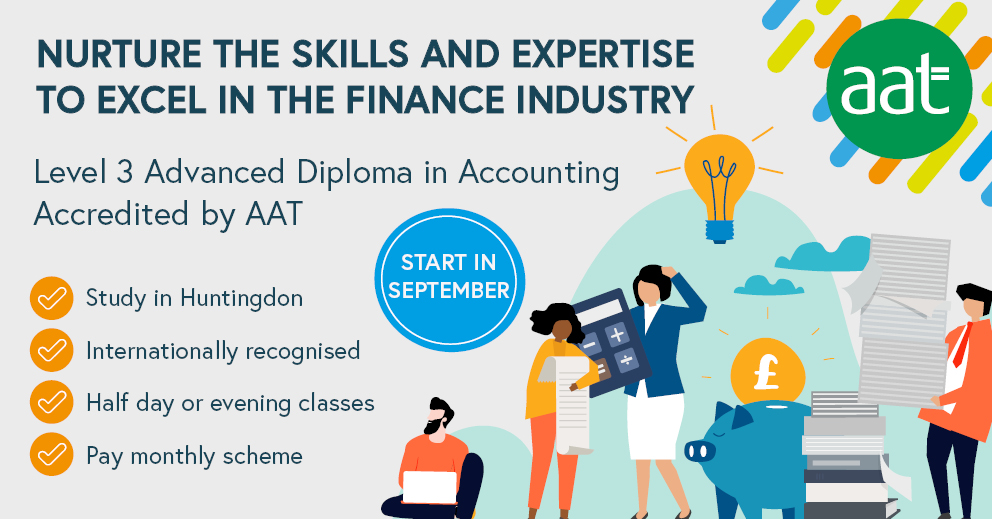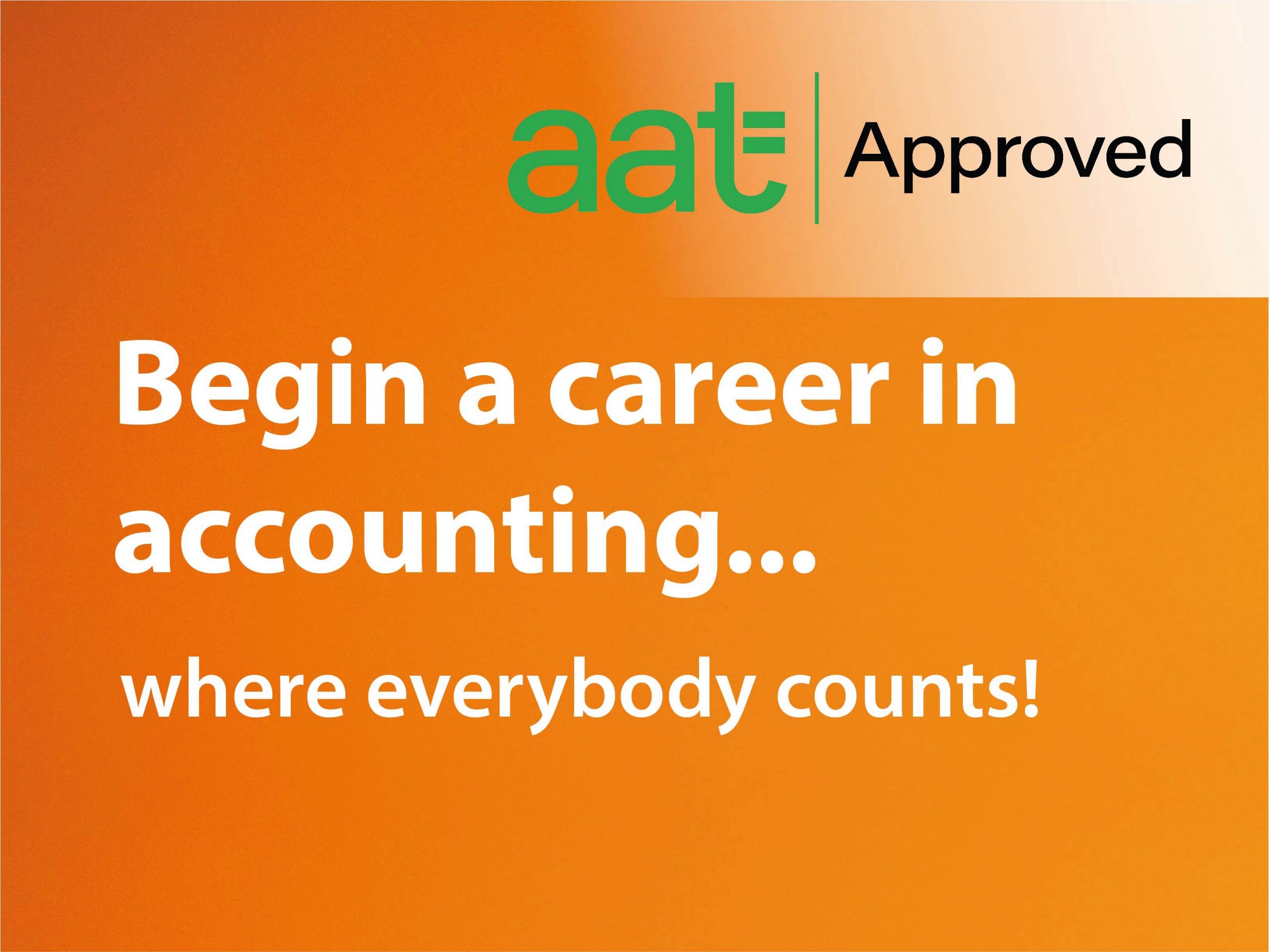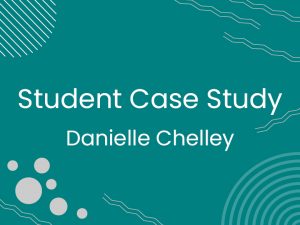AAT Level 3 Diploma in Accounting
Subject: Accounting & Bookkeeping
Awarded by the Association of Accounting Technicians (AAT), the AAT Level 3 Diploma in Accounting is the intermediate level of the internationally recognised AAT qualification.
This qualification is ideal for any of your team who are competent in manual double-entry bookkeeping and need to further develop their accounting skills. A range of complex accounting tasks such as maintaining cost accounting records and the preparation of income statements, reports and returns will be studied.
Key Facts
- Attendance: Half-day/evening classes or blended learning.
- Duration: One year.
- Next start date: Classroom attendance - September 2024. Please note, blended learning students can start at any time.
- Location: Huntingdon or blended learning.
Course delivery details:
| Location | Attendance Options | Day | Time |
| Huntingdon | Half-day release (am)
Evening |
Thursdays
Thursdays |
9:15am-1pm
5:30pm-8:30pm |
| Blended Learning | No college attendance required, start at any time | n/a | n/a |
Entry Requirements
Whilst there are no formal academic entry requirements to undertake the AAT Level 3 Diploma in Accounting, competency in manual double-entry bookkeeping as well basic maths and English skills are necessary.
Course Content
The Level 3 Diploma in Accounting covers a range of essential and complex accounting tasks, including maintaining cost accounting records and the preparation of reports and returns. Students will learn and develop skills needed for financial processes, including accounting principles and concepts, advanced bookkeeping and preparing financial statements. They will also understand the business environment, technology used in finance and accounting, business issues regarding payroll and value added tax (VAT) (which may be known by another name in other countries), issues in business, management accounting techniques, ethical principles and sustainability considerations for accountants.
This qualification offers a combination of classroom or online lessons and regular tutorial support (400 guided learning hours in total). In addition to your classroom or online lessons, students will be expected to study for an additional eight hours per week.
The following four units will be studied:
Financial Accounting: Preparing Financial Statements
This unit provides students with the skills required to produce statements of profit or loss and statements of financial position for sole traders and partnerships using a trial balance. In employment, students may be required to prepare a portion of, or all, the final accounts and this unit will give them the theoretical knowledge needed to complete that task. It will also allow them to understand how final accounts have been produced, either manually or automatically through use of accounting software.
- Legal requirements and preparation of partnership accounts, showing division of profits after adjusting for interest on capital, interest on drawings and any salaries due to each partner.
- Preparation of final accounts for partnerships and developing skills in restructuring accounting information.
- Preparing final accounts for sole traders, including the accounting treatment required to incorporate accruals and prepayments, provision for depreciation, irrecoverable debts and allowance for doubtful debts.
Tax Processes for Businesses
This unit explores tax processes that influence the daily operations of businesses and is designed to develop students’ skills in understanding, preparing, and submitting Value Added Tax (VAT) returns to HM Revenue and Customs (HMRC). The unit provides students with the knowledge and skills that are needed to keep businesses, employers and clients compliant with laws and practices that apply to VAT and payroll. Students will learn about legislation and the importance of maintaining their technical knowledge through monitoring updates. For VAT, students will understand the registration and deregistration rules, including signing up for Making Tax Digital (MTD), and the rules relating to specialist VAT schemes. Students will be able to recognise different types of supplies and calculate VAT correctly, understanding the importance of the rules relating to the recovery of input VAT and the sanctions and penalties for inaccuracies, omissions and failure to make submissions and payments within the correct timescales.
- Understanding current VAT regulations and building your knowledge of VAT registration requirements, different VAT schemes available, penalties for non-compliance and the different types of classification of supplies.
- Performing the calculations needed to complete a VAT return.
- Submitting completed documentation in a timely manner while maintaining an effective working relationship with the relevant tax authority.
Management Accounting Techniques
This unit provides students with the knowledge and skills needed to understand the role of management accounting in an organisation, and how organisations use such information to aid decision making. Students will learn the principles that underpin management accounting methodology and techniques, how costs are handled in organisations, and why organisations treat costs in different ways. Students will be able to recognise different approaches to management accounting and provide informed and reasoned judgements to guide management. They will also learn how to apply these principles and appreciate why effective management accounting is crucial to any organisation.
- Identifying why cost accounting is an important tool for an organisation.
- Different approaches to cost accounting and making informed and reasoned judgements to guide management and help decision making.
Business Awareness
This unit provides students with an understanding of the business, its environment and the influence that this has on an organisation’s structure, the role of its accounting function and its performance. Students will examine the purposes and types of businesses that exist, and the rights and responsibilities of key stakeholders. Students will learn what the micro- and macro-economic environments are and the impact and influence that changes in these environments can have on performance and decisions. This will include an understanding of the basic business law relating to the preparation of financial statements for different types of entities. Students will learn about the concepts of risk, types of risk and risk management for a business.
- Preparation of final accounts for sole traders, developing your understanding of accounting systems and the environment and principles under which organisations operate.
- Accounting adjustments and accounting for fixed assets.
Assessment
Computer based exams will be undertaken. As we are an AAT accredited exam centre these exams can be taken at College without the need to travel to an external exam centre.
Course Fees
Course fees can either be paid in full before the beginning of the course, on an annual basis, or via our ‘Pay As You Learn’ monthly payment scheme.
If your employee has not achieved your qualification by the planned end date continued support and course access is available by paying monthly direct debit payments until certification is achieved.
| Full Fee | Pay As You Learn |
| £2,086 | £174 per month |
Awarding Body Fees*
Payment for AAT membership, exam fees (approximately £472*) and textbooks (approximately £33 per unit) will also be required.
* Awarding Body Fees are payable by all students or employers and recharged at cost and may be subject to change.
These are current figures and may be subject to change. The differences in course fees reflect the level of funding that is available as a result of government policies and priorities. These may be as a result of age, employment status, previous education achievements, or location for example, and are outside the control of CAW Business School.
What Next?
Following completion of the AAT Level 3 Diploma in Accounting qualification your employee may wish to continue their studies by applying for the AAT Level 4 Diploma in Professional Accounting course.




